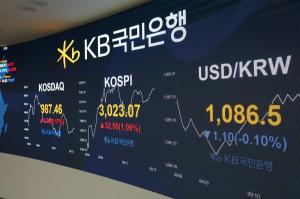(Sisa Today, Sisa ON, Sisa On = Reporter Park Jin-young)

The gap between the real economy and the financial market is widening. The economy of the common people, centered on self-employed people, is in a bad situation, but the financial market is booming, with the KOSPI surpassing 3000 for the first time in history and real estate soaring. Accordingly, the heads of financial authorities agreed, saying, “We must be wary of the gap between the real and the finance.”
‘Vigor’ by breaking all-time highs such as stocks and real estate
Financial assets, such as stocks and real estate, are hitting highs every day, and the funds are gathering. On the morning of the 6th, the KOSPI index recorded an intraday of 3000 for the first time in history, and the housing price forecast for December last year announced by the BOK recorded the highest ever. Despite the government’s strong real estate countermeasures, house prices are rising nationwide.
In addition, funds are also rushing into the virtual currency market. Bitgoin and Ethereum, the representative cryptocurrencies, have been on record growth since the first day of the new year. Bitcoin also recorded a record high of $33,000 (KRW 35.8 million) on the 2nd (local time).
On the other hand, according to the Financial Stability Report submitted by the BOK to the National Assembly’s Planning and Finance Committee on the 24th of last month, private credit combined with households and corporate loans rose 16.6 percentage points from the third quarter of last year to 211.2% of GDP. This means private sector debt is more than twice the GDP.
This is due to delays in repayment of principal and interest in response to Corona 19, and the risk of insolvency is delayed, and the risk of insolvency in the mid- to long-term household debt is increasing, considering the sharp increase in credit loans, which have a higher delinquency rate compared to home mortgage loans.

Heads of financial authorities “Big gap between finance and real things…requiring risk management”
Deputy Prime Minister Hong Nam-ki and Minister of Strategy and Finance said through a Pan-Finance New Year’s meeting on the 5th that “there is growing concern about the gap between the real and the finance.” He then said, “We will carefully manage market liquidity while paying attention to the possibility that the rapidly increased liquidity will cause a shift to the asset market and a surge in debt,” he called for active cooperation from the financial sector.
Bank of Korea governor Lee Ju-yeol said in his New Year’s address on the 5th, “Last year, our economy was the toughest year since the financial crisis.” “(This year) we are resetting everything to overcome the corona and create a better future at this opportunity.” It is time for the extraordinary resolution of’Great Reset’.’
He said, “Even though vaccines have begun to spread in some countries, there is a high degree of uncertainty until the corona is completely controlled.” They are in bulk.”
Governor Lee pointed out, “We need to have a high level of vigilance as the potential risks from policy authorities and financial sectors’ liquidity supply and interest repayment deferral measures are expected to be revealed in earnest this year.”
In particular, he stressed, “In a situation where the level of debt is high and the gap between finance and real is widened, the market can be greatly shaken even by a small shock, so it is necessary to take a closer look at the vulnerable areas of the financial system.”
In addition, in a New Year’s address on December 31, last year, Eun Seong-su, chairman of the Financial Services Commission, said, “Amid the rapidly changing economic and financial environment, such as the economic crisis triggered by Corona 19 and the acceleration of a non-face-to-face digital economy, the role of finance is more important than ever. “Do” he emphasized.
He said, “We must thoroughly manage risk factors and actively support innovation and challenges to overcome the economic crisis and lead a new growth leap forward.”
Financial Supervisory Governor Yoon Seok-heon also said on the same day, “The accumulation of household debt, the accumulation of marginalized companies due to the economic downturn, and the increasing difficulties of the vulnerable groups such as the self-employed are expected to continue to act as a burden on the Korean economy.”
He then emphasized, “We will improve our resilience in times of crisis by expanding our loss-absorbing capacity across the financial sector, and we will do our best to manage internal controls and risks.”
Copyright © Shisa Today (Sisa ON) Unauthorized reproduction and redistribution prohibited

Responsibility: Banks, savings banks, and credit card companies are in and out.
Motto: If you don’t live as you think, you will think as you live.
